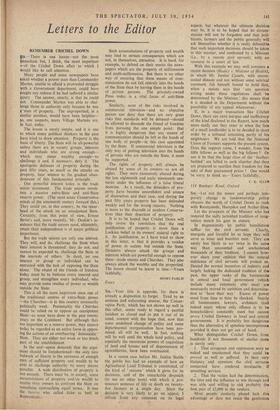SIR.—Your title is apposite, for there is already a disposition
to forget. Tired by an anxious and exhausting session, the Conser- vative Party, which has not shown up well in this affair, seems ready to regard a painful incident as closed and to put it out of its mind, content with the hope that, now that some undefined change of policy and some departmental reorganisation have been pro- mised, all will be well. In fact, nothing will be well until the whole land policy, and especially the enormous powers of requisition of land and houses and of dispossession of agriculturists, have been overhauled.
In a recent case before Mr. Justice Stable the public has had an example of how an Agricultural Land Tribunal is constituted, of the kind of reasons' which it gives for its decisions, and of the remarkable despatch (to use no other term) with which it pro- nounces sentence of life or death on twenty- five .farmers in a single day. Since the decision is very likely to go on appeal, I refrain from any comment on its legal aspects but whatever the ultimate decision may be, it is to be hoped that its circum- stances will not be forgotten and that poli- ticians, farmers and the public generally will ask themselves whether it is really defensible that such important decisions should be taken in this manner, and confirmed by a Minister (i.e., by a remote civil servant), with no recourse to a court of law.
With this example we may well compare a recent decision (Healey v. Minister of Health), in which Mr. Justice Cassels, with uncon- cealed distaste and not without some satirical comment, felt himself bound to hold that, when a statute says that ' any question arising under these regulations shall be determined by the Minister,' this means that it is decided in the Department without the possibility of any appeal whatsoever.
If, in a major transaction like Crichel Down, there can exist intrigue and inefficiency of the kind disclosed in the Report, how much more easily can they enter in when the fate of a small landholder is to he decided in short order by a tribunal consisting partly of his neighbours. We are told that the National Union of Farmers supports the present system. Does the support come, I wonder, from the little fellows as well as the big fellows ? Or can it be that the large class of the ' feather- bedded ' are lulled to such slumber that they are prepared to sacrifice their freedom for the sake of their guaranteed prices ? One would be sorry to think so.—Yours faithfully,
C. K. ALLEM
114 Banbury Road, Oxford


































 Previous page
Previous page